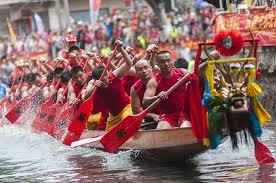The Dragon Boat Festival, also known as Duanwu Festival, is an ancient and vibrant celebration that brings together communities in a spectacular display of culture and athleticism. Held annually on the fifth day of the fifth month of the Chinese lunar calendar, this festival is steeped in rich history and tradition, captivating participants and spectators alike.
Historical Roots
The origins of the Dragon Boat Festival date back over 2,000 years and are intertwined with various legends. The most popular story commemorates Qu Yuan, a patriotic poet and minister during the Warring States period. Qu Yuan, who drowned himself in the Miluo River as a protest against corruption, inspired villagers to race out in their boats to save him or retrieve his body. They threw rice into the water to distract the fish from his body, a tradition that evolved into the modern-day practice of making and eating zongzi—glutinous rice dumplings wrapped in bamboo leaves.
Thrill of the Races
At the heart of the Dragon Boat Festival are the exhilarating boat races. Dragon boats, ornately decorated with dragon heads and tails, glide through the water powered by teams of paddlers. The rhythmic pounding of drums and the synchronized rowing create an electrifying atmosphere, drawing large crowds to riverbanks and lakeshores.
Each dragon boat is typically manned by 20 paddlers, a drummer, and a steerer. The drummer sets the pace, while the paddlers work in unison to propel the boat forward with powerful, coordinated strokes. These races are not only a test of speed but also of teamwork and endurance, making them a thrilling spectacle.
Culinary Delights
No Dragon Boat Festival is complete without indulging in traditional foods, especially zongzi. These pyramid-shaped dumplings come in various flavors and fillings, from sweet red bean paste to savory pork belly. The meticulous process of preparing zongzi—soaking rice, marinating fillings, and wrapping them in bamboo leaves—reflects the care and dedication passed down through generations.
Cultural Significance
Beyond the excitement of the races and the delicious food, the Dragon Boat Festival is a time to honor cultural heritage and foster community spirit. In addition to the races, the festival features a range of activities such as traditional music and dance performances, lion dances, and other cultural demonstrations.
The festival also emphasizes the importance of health and well-being. Historically, people would hang pouches of medicinal herbs to ward off diseases and evil spirits. Today, this practice is echoed in the festival’s emphasis on outdoor activities, communal gatherings, and the enjoyment of traditional foods believed to have health benefits.
A Global Celebration
While the Dragon Boat Festival has its roots in China, it has become a global phenomenon. Cities around the world, from Vancouver to Sydney, host dragon boat races and celebrations, showcasing the universal appeal of this vibrant tradition. These international events not only bring together diverse communities but also promote cultural exchange and understanding.
Conclusion
The Dragon Boat Festival is more than just a historical celebration; it is a dynamic event that bridges the past and present, tradition and modernity. Whether you’re racing in a dragon boat, savoring zongzi, or simply enjoying the festivities, the Dragon Boat Festival offers something for everyone. As it continues to grow in popularity around the world, this ancient festival remains a powerful reminder of the enduring values of community, tradition, and the human spirit.



